The opening of a new packhouse and four cool stores in Te Puke provides reassurance to the burgeoning kiwifruit industry that kiwifruit growth can be processed.
The $40 million, 5400 square metre packhouse and cool store complex was developed by Bay of Plenty kiwifruit and avocado orchard management and post-harvest company DMS Progrowers, on its Te Matai Road site in Te Puke.
The new packhouse will enable DMS to double its packing capacity at the Te Puke site.
In 2021 the company packed 14.2 million trays of kiwifruit at two sites, but the new complex will extend that to 17 million trays in 2022.
DMS is the first post-harvest company since 2019 to build a new packhouse in the Bay of Plenty, an initiative prompted by the region's record-breaking kiwifruit crop.
New Zealand's kiwifruit industry is predicted to pack 190 million trays in 2022 with ongoing annual increases in fruit volume as greenfield and Gold kiwifruit conversions come into production.
DMS CEO Derek Masters says the company anticipates packing volume across its Te Puna and Te Puke sites will increase to about 20 million trays over the next few years and this new development will align with this anticipated growth.
'In around five years we will probably develop a further packhouse and supporting cool stores at the Te Matai Road site to match the growth of the kiwifruit industry.”
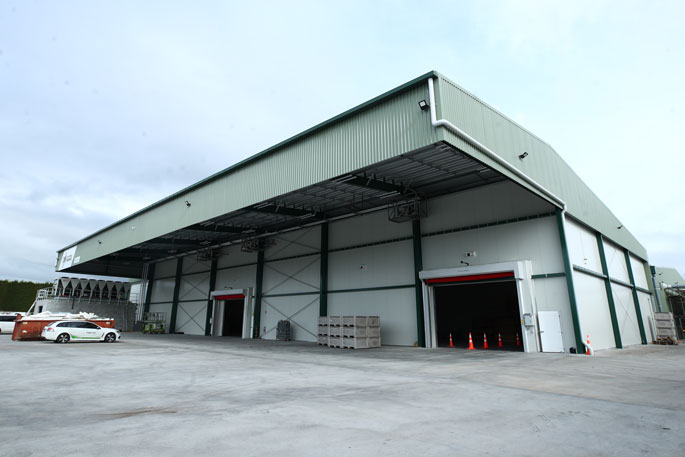
Masters says the new packhouse will require an additional 100 seasonal staff meaning that, at peak, about 700 people will be involved in the processing of fruit across three shifts, 24 hours a day, seven days a week.
'The ability of our growers to meet global demand for kiwifruit depends to a great extent on confidence that there will be sufficient processing capacity for all the fruit they produce.
'Providing this reassurance to our growers was a driving motivation for the development of this facility,” Derek says.
'Planning for more packing capacity began nearly two years ago. Our Te Puna site was at full capacity but, fortunately, we were able to purchase an adjacent 7.5 hectare kiwifruit orchard.”
The impact of Covid
Known as the Rimu Shed, the new packhouse was commissioned on April 6, one week short of the target completion date, and under budget. Derek says this is very satisfying, especially given the uncertainties of the Covid environment and supply chain issues for plant and materials.
Eighteen months of planning preceded the commencement of construction in August 2021 but Derek admits that, even though the risk register anticipated an exhaustive list of 'things which could go wrong and throw deadlines out” it simply was not possible to plan for the impact Covid lockdowns and shipping delays would have.
The biggest concern related to the heart of the new packhouse, the MAF Roda Packing Machine – one of the largest in New Zealand with 10 lanes feeding kiwifruit into eight lanes after passing through a state-of-the-art camera grader which takes 30 photo shots of each kiwifruit, ensuring the highest standard of quality classing.
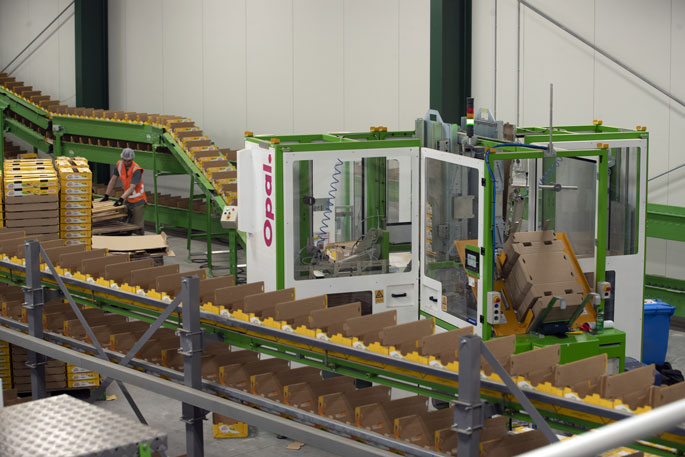 One of the carton erector machines feeds directly into the MAF Roda pacing machine, significantly streamlining the process.
One of the carton erector machines feeds directly into the MAF Roda pacing machine, significantly streamlining the process.
It is not an over-statement to say the MAF Roda is the heart of the packhouse because, in contrast to packing machines generally being sized to suit a specific size building, the DMS MAF Roda's dimensions determined the size of the packhouse.
'We knew the optimum size packing machine we needed to deliver the desired throughput and so we sized the building to house the machine. This probably contrasts with the traditional approach which is to size the machine to an existing building.”
Bin store and bin tip rooms, with a combined floor area of 1600sqm, flank the entry to the packhouse. Once harvested, the fruit is delivered to the humidity and temperature controlled bin room and then to the bin tip room before it goes into the packhouse and onto the MAF Roda packing machine for sorting and packing.
No room for delays
The various components of the MAF Roda packing machine originated from Spain and France, their volume and complexity requiring them to be packed in 32, 40ft containers. The containers were despatched on a number of ships which were each variously affected by the shipping delays which are crippling world trade, as a result of the global pandemic.
Masters admits he had a few anxious moments over Christmas as the deadline for all components arriving approached.
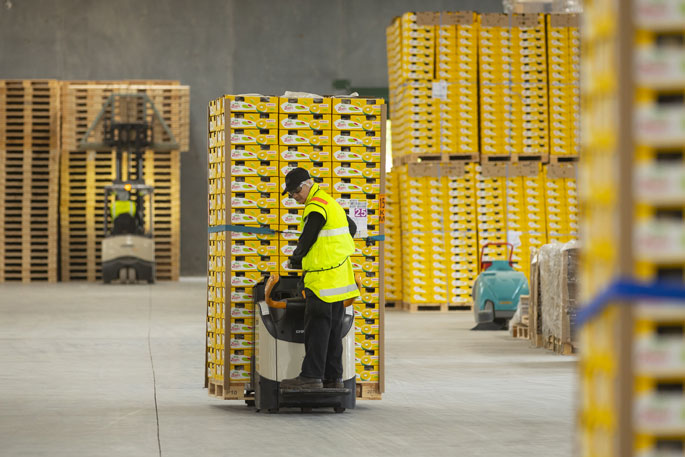
'There was no Plan B. We had to have the packhouse and cool stores ready for the start of the 2022 season. Regardless of Covid, kiwifruit keep on growing and we had to have the packhouse up and running for the start of the season.”
As it turned out, all the containers did arrive in time for the MAF Roda and DMS teams to assemble and have it operational two weeks short of the original deadline.
Latest in automation
The 10 lane singulator MAF Roda is pre-programmed to Zespri quality specifications. The camera grading identifies any imperfections in the fruit, automatically segmenting it into three classes – Class 1 export, with Class 2 local market and Australia, and Class 3 local market.
The machine packs, on average, 7000 trays per hour in contrast with DMS's three older and smaller MAF Roda machines in the original packing house at Te Puke and at Te Puna, which pack up to 5,500 trays per hour.
In any year the packing machines operate 24 hours per day seven days a week, starting in May and finishing in June.
Derek says the packing machine's analysis generates a range of metrics which provide a very detailed insight into the reasons fruit is rejected.
'This information is valuable for us as processors, and for our growers who look at the reject analysis thoroughly so they can see what volume of their fruit goes into the various classes and why.
'We also have a quality control team who conduct microscopic inspections of the various classes and weights of fruit as a secondary evaluation of quality and consistency.”
On time and on spec'
The protracted Level 3 Covid lockdown in Auckland also compromised the ability of materials to be manufactured and delivered.
Steel for the portals and roofs of the packhouse and cool stores was a case in point, with global shortages, compounded by the lockdown, a potential game changer.
Project Manager, Sarah Wombwell of BOP Integrated Project Solutions says any adverse impact was avoided thanks to close and early collaboration with Jensen Steel Fabricators who ensured the steel portal frames and wall sections were available and delivered when required.
DMS has used Jensen Steel for a range of building projects and Sarah Wombwell said that track-record provided a high level of reassurance knowing that what was needed, would be delivered on time and to specifications.
Sarah specialises in project managing large and complex projects but admits the Covid environment added another dimension simply because so many elements were out of anyone's control.
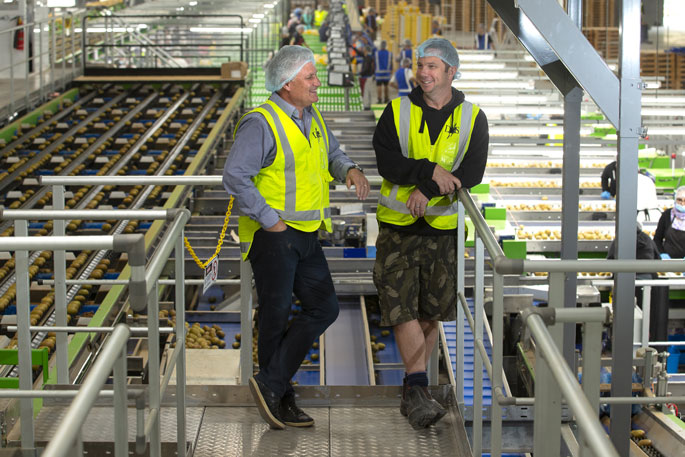
DMS CEO Derek Masters ctahces up with Te Matai Rd sire manager Dave Pharo.
'The fact we were able to deliver the project on time and under budget is largely down to the expertise and extensive industry experience of the DMS executive team and the overall culture of the organisation from the Board to the skills and attitude of the staff who work in the packhouse and cool stores.
'It goes without saying too, that we were dependant on a team of contractors who balanced the environment with the role they had to play in achieving our deadline,” Sarah Wombwell said.
Redco NZ did the concept and construction design of the pack house with the role of project lead going to local Tauranga construction company iLine Construction whose project manager Tony Watson has vast experience in the construction of kiwifruit buildings.
Thinking outside the box
The new packhouse features a range of innovations unique to DMS – one relating to carton assembly.
'A tremendous number of cartons are required for kiwifruit packing,” Derek says.
'Traditionally those cartons are assembled in a separate building and delivered, by forklift, to the packhouse.
'We wanted to streamline that process and so located the carton erector machine alongside, and feeding automatically to, the MAF Roda packing machine. It has really streamlined the whole process and works really well.”
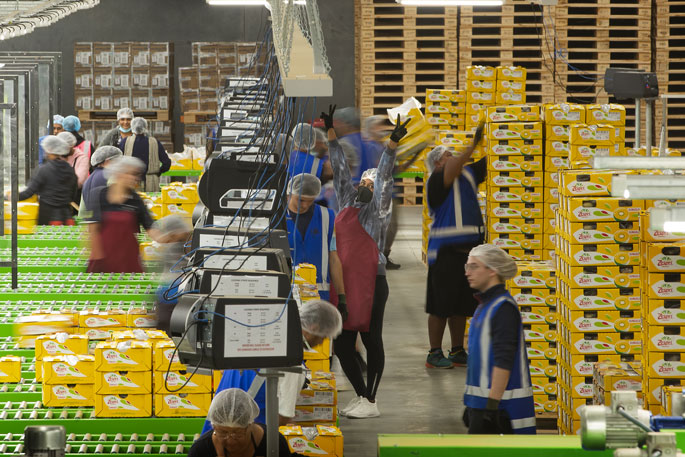
Once packed, the cartons are taken to the other side of the packing machine where the automatic strapper pallet machine straps the pallets to Zespri specifications.
The pallets then go to pre-coolers which chill the pallets to 4 or 5degC before going to the cool stores for storage until they are called up for export orders.
New cool stores
The new packhouse was operational on April 6 with a blessing by the local iwi taking place on April 8.
'Until 6 April we processed early season fruit through our existing shed on the Te Matai Road site and at Te Puna,” Derek says.
'Harvesting of Gold kiwifruit has now started coinciding with our heightened packing capability.
'Developing a high throughput packhouse called for complementary cool storage where all the fruit can be stored until it is despatched.”
Concept and structural engineering for the four new cool stores was undertaken by BSK Consulting Engineers.
The location of the new cool stores is adjacent to the new packhouse and they were expected to be fully operational in the last weeks of April ready for the peak of the season. In the meantime early season fruit was stored in DMS's existing cool stores.
The refrigeration and electrical fit-out of the four cool stores and packhouse bin store was undertaken by Orr Refrigeration & Electrical Orr in conjunction with Active Refrigeration.
The cool store walls are insulated panels from Bondor NZ with steel purlins and a corrugated iron roof. The cool stores were built by Shawn Williamson Building and Derek Masters said their ‘can do' attitude to go the extra mile was a huge asset.
About 1500 cubic meters of concrete was required for the truck loading and unloading area outside the new packhouse – the surface acting as the roof for a vast underground stormwater system where the run-off from the site's roof and hard surface areas is stored.
Derek says Moon Civil & Drainage scoped the system to store the runoff from the current and future buildings, future-proofing the site. The system monitors and manages the storage and eventual dispersal of water into surrounding soil.
History of the Te Matai Road site
DMS has had a packhouse and cool stores on the Te Matai Road site in Te Puke for about 20 years. Until 2020 the land area was 4.5 hectares, but the decision to expand the packing and cool stores required more land.
The neighbouring 7.5 hectare orchard belonged to the Hislop family.
'We purchased it and had the land rezoned to post harvest. The orchards were subsequently removed clearing the building sites for the packhouse and cool stores,” Derek says.
The Hislop family home remains, along with the Rimu tree - which the packhouse is named after - and gardens.
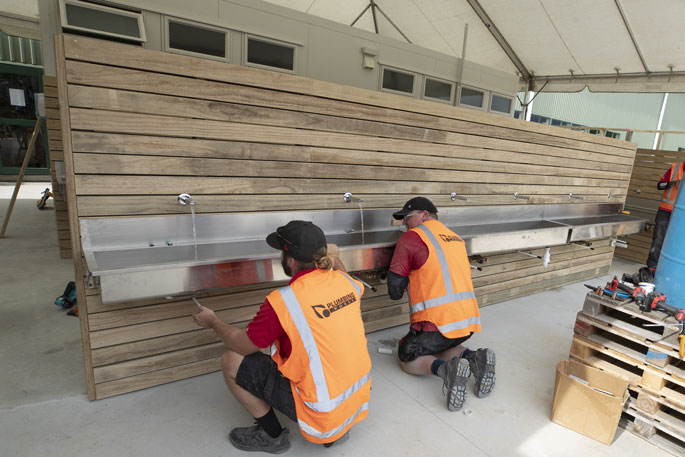 Stainless steel hand basins are located at the entrance to the new cafeteria.
Stainless steel hand basins are located at the entrance to the new cafeteria.
The home is being refurbished into the main site office and the gardens remain, adjoining the cafeteria and providing staff with a great environment for their breaks.
The total site of 12ha future-proofs DMS, but Derek admits the current processing capacity 'will probably need to be replicated in around five years based on growth of the kiwifruit industry”.
Growing skills and retaining staff
Derek Masters joined the kiwifruit industry 13 years ago. A mechanical process engineer by trade he was originally attracted to the role of Chief Operating Officer 'because DMS had a great reputation.
'The values of its two director families evident at every layer of the organisation. I was appointed CEO three years ago.”
DMS has 173 permanent staff across its two pack house sites and at its Tauranga head office, with seasonal workers taking this number up to 700 for the 2022 season.
'DMS is a very progressive company; there is a lot of competition for good staff across the kiwifruit industry and I can safely say that we offer our people a great package of incentives and training to grow their skills and retain their loyalty.
'Our starting hourly rate for packhouse and orchard staff is $24 per hour, and there are a range of benefits including free cooked meals at every break and regular prize draws, based on attendance, of such things as iPods, IPhones and branded clothing.”
Café-style staff room
The new Te Matai Road cafeteria challenges the concept of a traditional ‘smoko room', with a spacious, beautifully designed café style environment constructed by Shed Boss of Tauranga.
Opening onto the gardens outside the reburbished homestead, the cafeteria provides staff with a relaxing environment with coffee and tea making facilities, a free meal for every shift and access to heavily subsidised food.
The Plumbing Works team is now putting the finishing touches to stainless-steel hand basins located at the entrance to the new cafeteria.
DMS is a food industry organisation and high standards of hygiene are evident across the site. Handwashing is a requirement before entry to the pack house, before entering the cafeteria and again when re-entering the pack house. A roof will shortly be installed above the hand basins to protect and shelter from the weather as staff walk to and from the cafeteria.
Derek says the Plumbing Works team has looked after all the plumbing, storm water, sewerage and water system needs and have done 'an amazing job”.
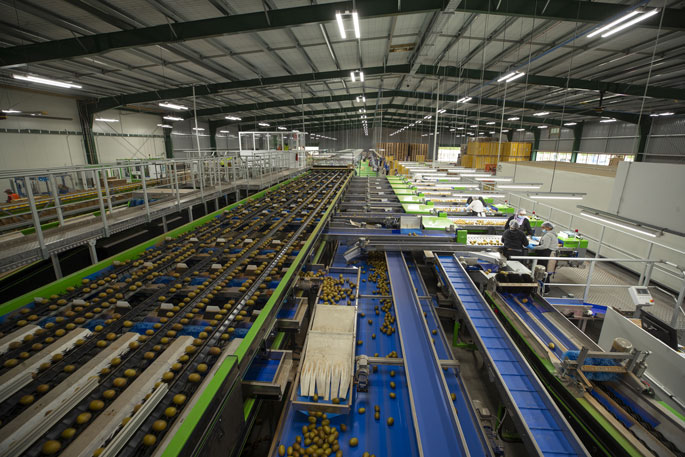
The main stormwater reticulation and fire control water system were installed by Moon Civil.
Preparation for the new packhouse and cool store facilities began months before the buildings were commissioned.
'Our people had to be ready to hit the ground running and they've done that. Their pride in the new environment and the role they play, is pretty evident as you move around the site.”
Workers arrive in the nick of time
Derek Masters admits DMS is fortunate that its regular RegularSeasonal Workers (RSEs) have arrived from the Pacific Islands in time for the peak of the season.
'Overall, we have a great team. They're motivated and hard-working and are a huge asset to the company and the industry.”
From orchard to cool store
The DMS laboratory, located in the original Te Matai Road site office, is the first step in a defined process which ends with fruit being stored in the cool stores ready for export overseas or supply to the local market.
The first step is when each orchard sends a sample of fruit, considered ready for harvest, to the laboratory for checking such things as brix levels, seed quantity and colour.
Once approved, ‘clearance-to-pick' authorisation is given to the orchard to commence harvesting the fruit.
Once harvested the kiwifruit is delivered and unloaded into the temperature and humidity controlled bin store room at the entry to the Te Matai Road packhouse.
Each bin has a bin card which states which orchard it originates from, its maturity and the date it was picked.
The fruit remains in storage before going to the bin tip room from where it is loaded onto the MAF Roda packing machine for sorting and packing.
Once emptied, the bins are sanitised and restacked ready for return to the orchards.
Ready, steady, go
After more than 18 months of intensive dedication and work the DMS Te Matai Road site is set up and ready for a bumper kiwifruit season.
Te Matai Road site manager Dave Pharo says it's been a long time coming.
'We've been looking forward to this for what seems like an eternity.
'The new complex provides staff with an amazing environment – everything is new, brand new purpose-built pack house, brand new packing machine, carton erector and strapping machine, new cool stores and a great cafeteria.”
Derek sums it up by saying the DMS team supported by fantastic leadership from project manager, Sarah Wombwell, and a great team of contractors, most of whom hail from the Bay of Plenty, have achieved a huge amount in a relatively short time.
'I think there is a collective sense of pride in what we've created – for DMS, for our growers but, ultimately, for the New Zealand kiwifruit industry.”
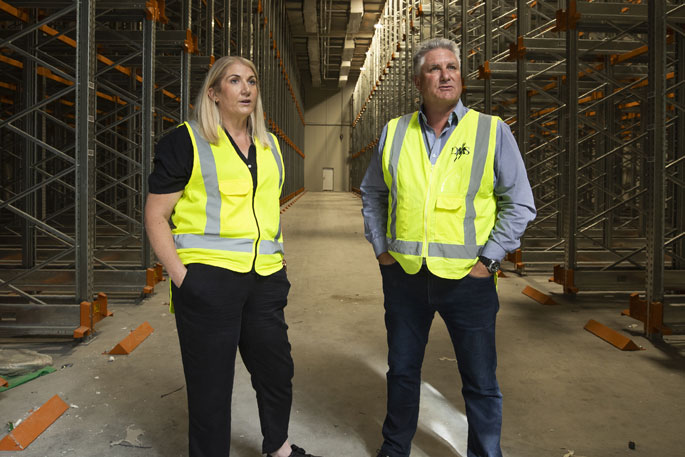 Sarah Wombwell and Derek Masters.
Sarah Wombwell and Derek Masters.

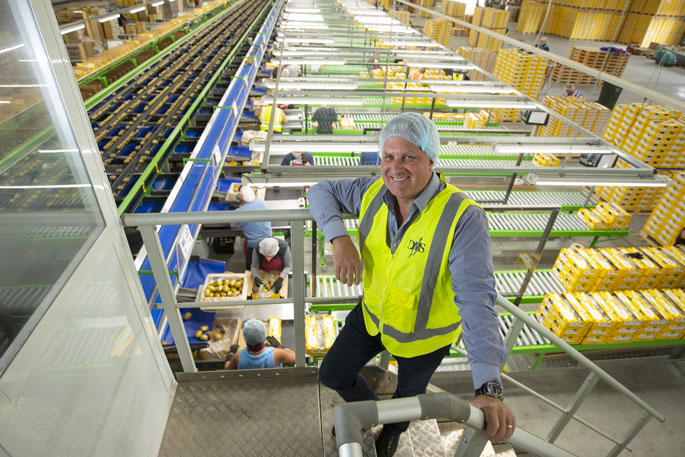

0 comments
Leave a Comment
You must be logged in to make a comment.